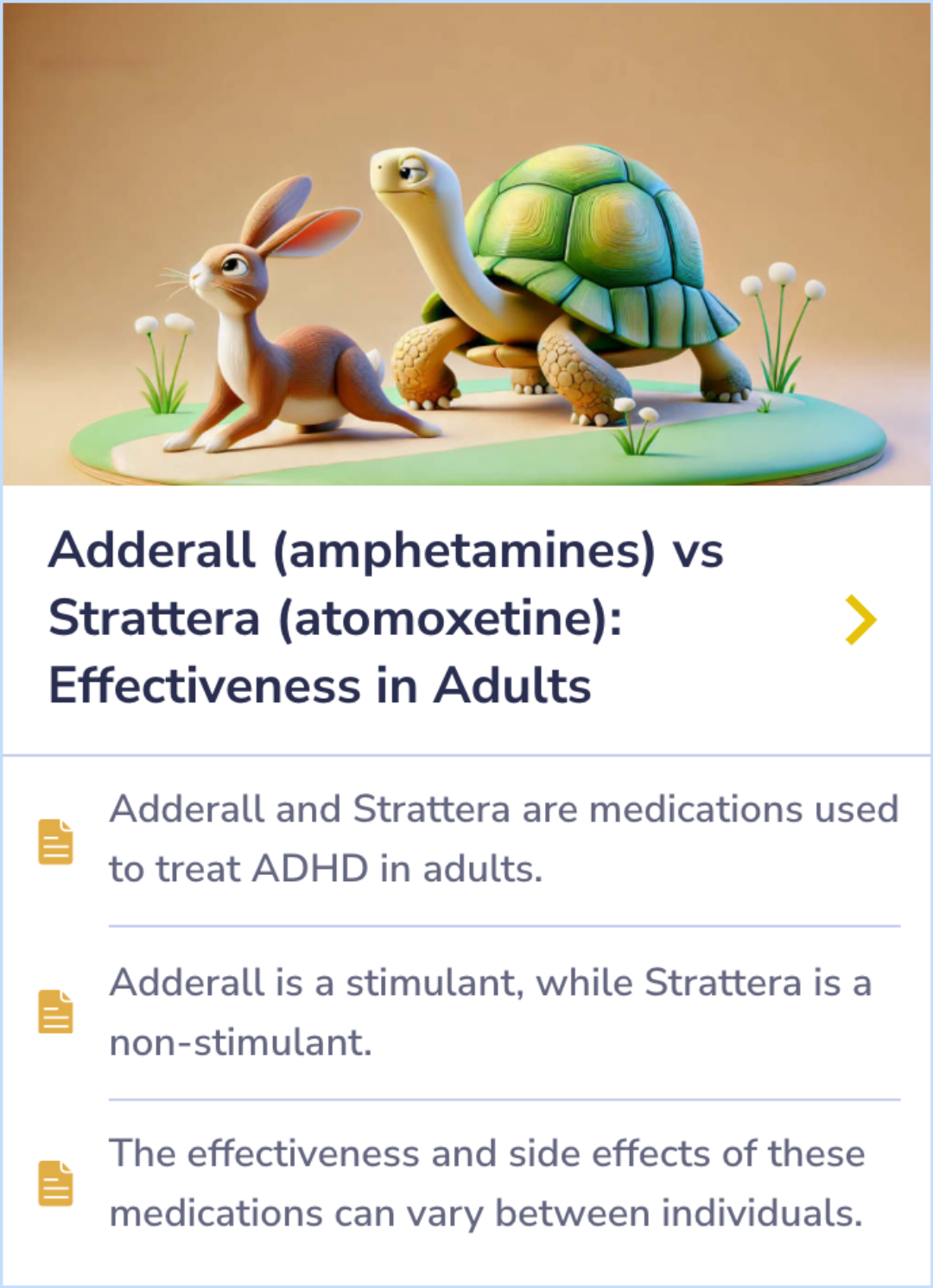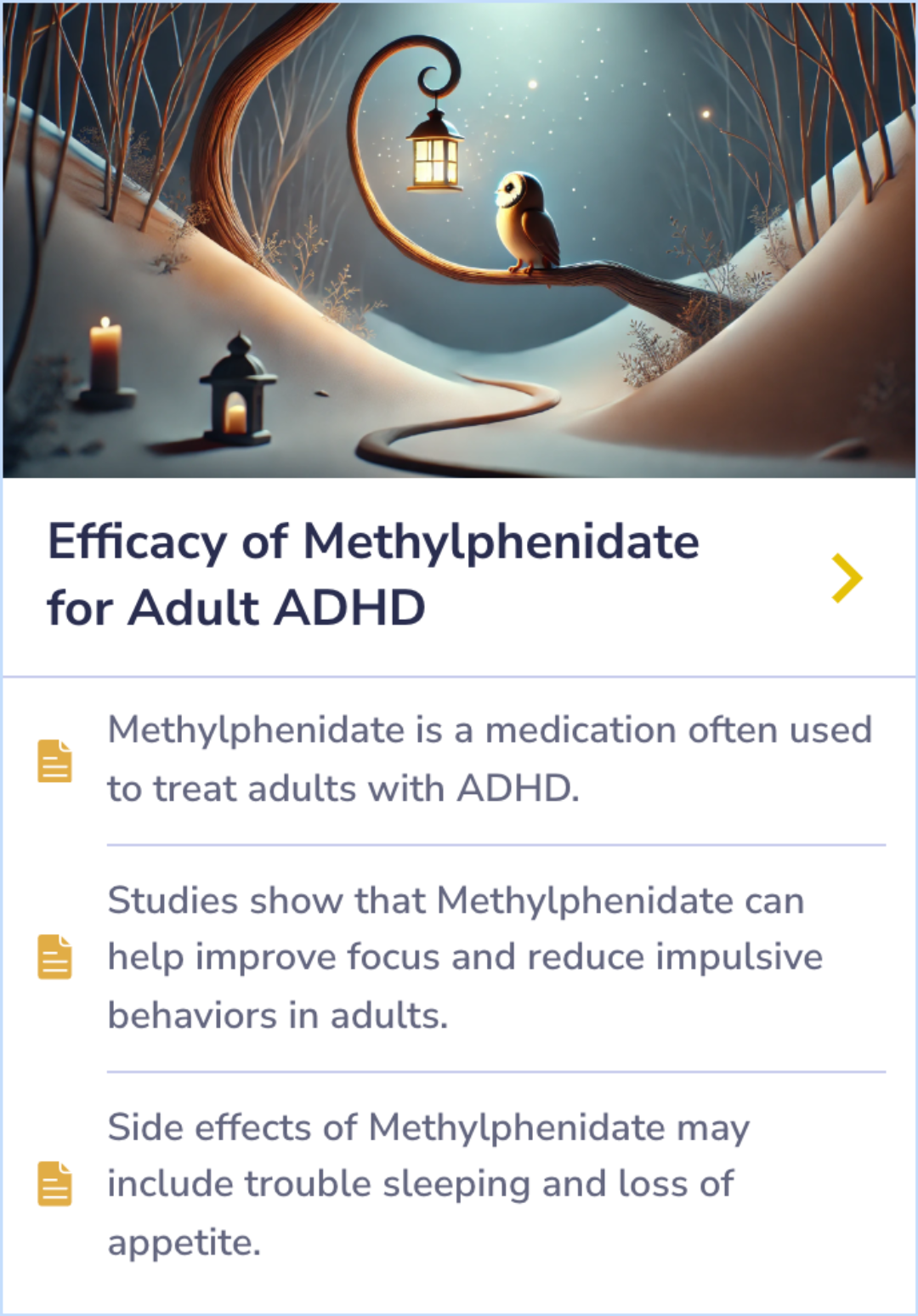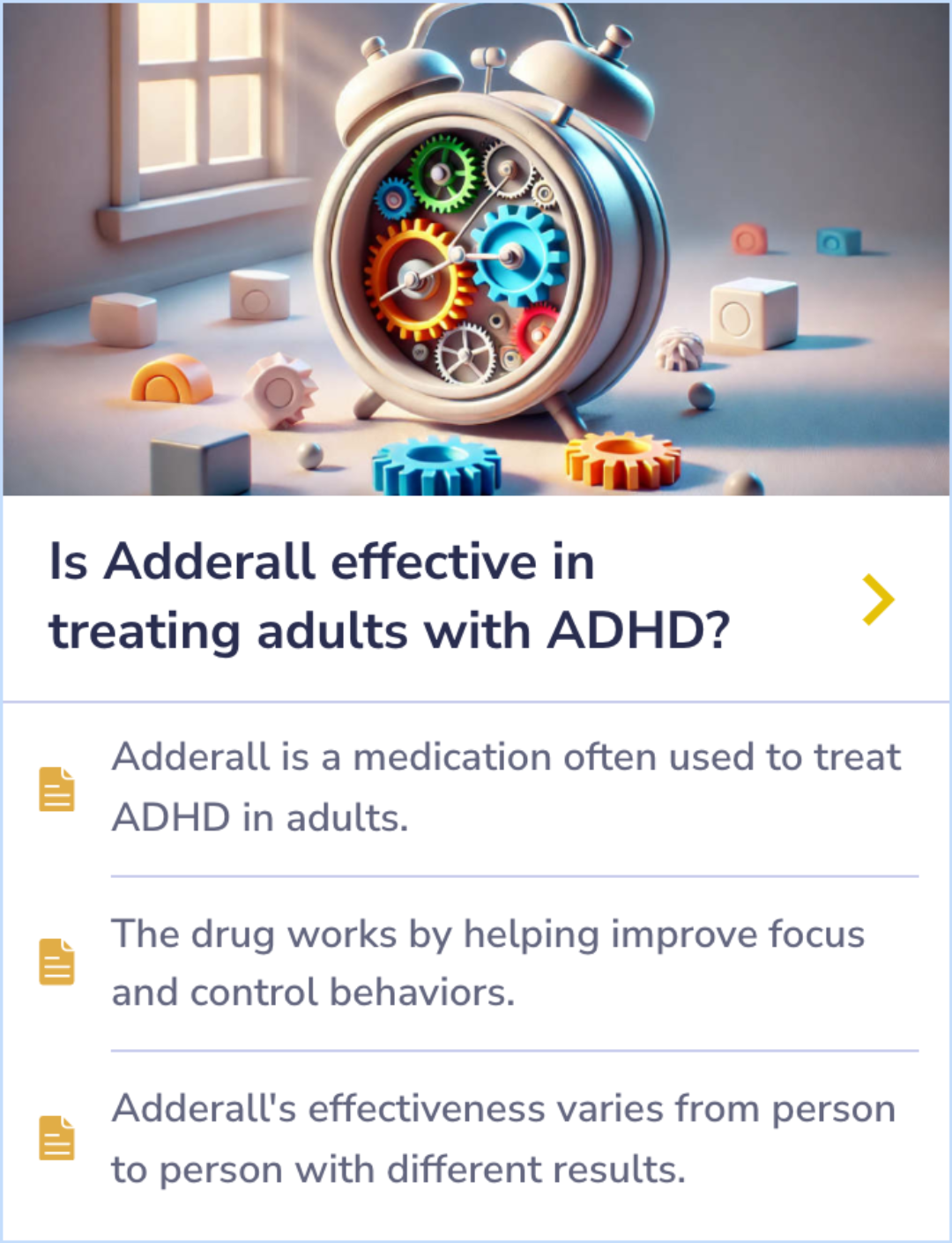ADHD Drug Comparisons
Evidence Based Comparison
Adderall (Amphetamines) vs Ritalin (Methylphenidate): Efficacy in Adult ADHD
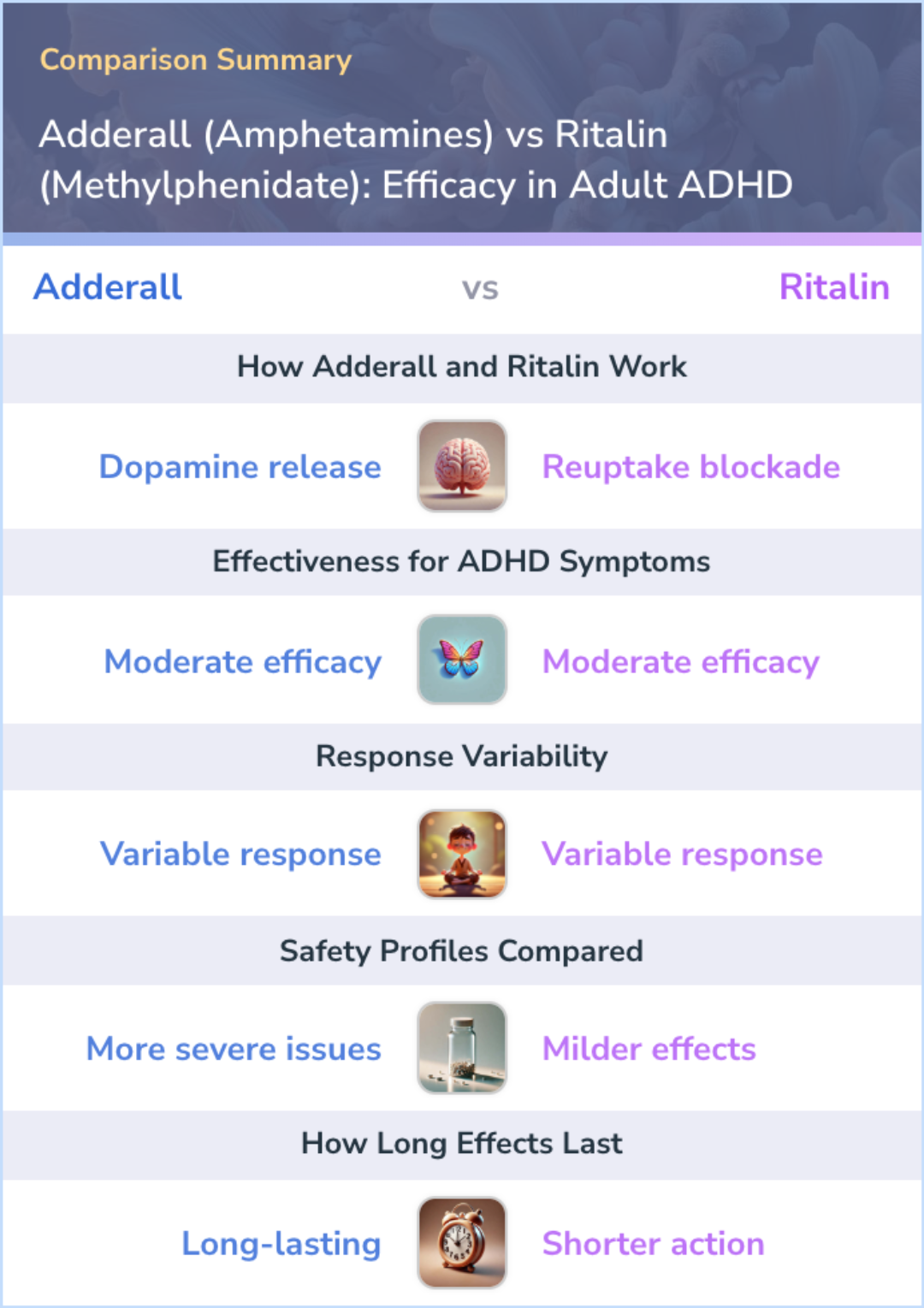
Summary
🧠
How Adderall and Ritalin Work in ADHD
Adderall releases dopamine, while Ritalin inhibits dopamine reuptake, influencing ADHD symptom control differently.
⚖️
Effectiveness of Adderall vs. Ritalin
Adderall often shows slightly higher efficacy in reducing ADHD symptoms, but both medications are effective.
🔄
Differences in Patient Responses
Patients may respond differently to Adderall or Ritalin due to individual differences in metabolism and drug action.
Comparison
Mechanism of Action: Adderall vs Ritalin
Adderall and Ritalin both increase dopamine and norepinephrine activity but work differently at the cellular level. Adderall releases newly synthesized dopamine, while Ritalin primarily blocks dopamine reuptake. These mechanisms affect ADHD symptoms differently.
Adderall
"The primary mode of action of amphetamine, which causes the release of newly synthesized cytosolic dopamine from the nerve terminal."
Challman et al. 2000Ritalin
"Methylphenidate binds to the dopamine transporter in the presynaptic cell membrane, blocking reuptake of dopamine and causing a resultant increase in extracellular dopamine levels."
Challman et al. 2000
⭐️ flashcard
How Adderall and Ritalin Work
Adderall increases dopamine release from nerve terminals.
Ritalin blocks dopamine reuptake in the synaptic cleft.
Comparison
Efficacy in Reducing ADHD Symptoms
Studies show both Adderall and Ritalin are effective for reducing core ADHD symptoms. Some evidence indicates Adderall may have a slightly greater effect, but both have strong efficacy profiles overall.
Adderall
"AMP and MPH have been shown to exhibit comparable efficacy in 2 meta-analyses, with other analyses reporting that AMP has moderately greater effects than MPH."
The pharmacology of amphetamine and methylphenidateRitalin
"In comparison to active treatments, MPH turned out to be marginally-to-moderately less efficacious than amphetamines (including lisdexamphetamine)."
Methylphenidate for attention-deficit/hyperactivity disorder in adults: a narrative review
⭐️ flashcard
Effectiveness for ADHD Symptoms
Adderall may show moderately greater effects on core symptoms.
Ritalin is effective for ADHD but may be marginally less efficacious.
Comparison
Individual Variability in Response
Both Adderall and Ritalin have varied responses among individuals. Some patients who do not respond well to one may find significant benefit from the other, indicating the need for personalized treatment.
Adderall
"Some research also suggests that a few individuals who do not respond to methylphenidate treatment for ADHD experience significant benefit from amphetamine (and vice versa)."
Potential Adverse Effects of Amphetamine Treatment on Brain and Behavior: A ReviewRitalin
"There is marked individual variability in the dose-response relationship for methylphenidate, and therefore dosage must be titrated for optimal effect and avoidance of toxicity in each child."
Pharmacokinetics and clinical effectiveness of methylphenidate
⭐️ flashcard
Response Variability
Adderall shows variability in response; may benefit non-responders to Ritalin.
Ritalin has significant individual variability in dose-response.
Comparison
Safety and Side Effects
While both Adderall and Ritalin share similar side effect profiles, some evidence suggests that Adderall may cause more severe issues like insomnia and irritability. Ritalin is associated with milder side effects like appetite loss and insomnia.
Adderall
"In general, these studies found similar side effect profiles for the two drugs. One of the larger and best controlled studies noted that the severity of adverse events may be greater for amphetamine, especially with respect to insomnia, negative affect, irritability, proneness to crying, anxiety, sadness/unhappiness, and nightmares."
Potential Adverse Effects of Amphetamine Treatment on Brain and Behavior: A ReviewRitalin
"The most common MPH-related adverse events are loss of appetite and insomnia (with the risk of the latter moderated by the formulation used and the treatment regimen)."
Methylphenidate for attention-deficit/hyperactivity disorder in adults: a narrative review
⭐️ flashcard
Safety Profiles Compared
Adderall may lead to more severe insomnia and irritability.
Ritalin is associated with appetite loss and insomnia.
Comparison
Duration and Persistence of Effects
Adderall tends to have a longer-lasting effect on reducing ADHD symptoms compared to Ritalin, which often requires multiple doses throughout the day due to its shorter action span.
Adderall
"In controlled clinical trials, between 55−70% of ADHD subjects manifest 'clinically significant' improvement lasting up to 4−6 weeks."
Potential Adverse Effects of Amphetamine Treatment on Brain and Behavior: A ReviewRitalin
"Several studies (including 2 double-blind, placebo-controlled trials) have shown comparable short efficacy between sustained-release and standard methylphenidate for the management of ADHD."
Challman et al. 2000
⭐️ flashcard
How Long Effects Last
Adderall often provides longer-lasting symptom relief.
Ritalin may require multiple daily doses for sustained effect.
Peer Reviewed Study
Study: Adderall vs. Ritalin Efficacy in Adults
A meta-analysis comparing Adderall and standard-release methylphenidate shows Adderall to have a small, but statistically significant, advantage for symptom and global ratings.
Adderall's impact was stronger for clinician and parent global ratings compared to methylphenidate. This benefit held for both fixed and best dose trials.
Adderall's impact was stronger for clinician and parent global ratings compared to methylphenidate. This benefit held for both fixed and best dose trials.
Adderall
Adderall shows small yet significant improvement in symptoms and global ratings.
Ritalin
Ritalin serves as a comparator with slightly lower efficacy in global ratings.
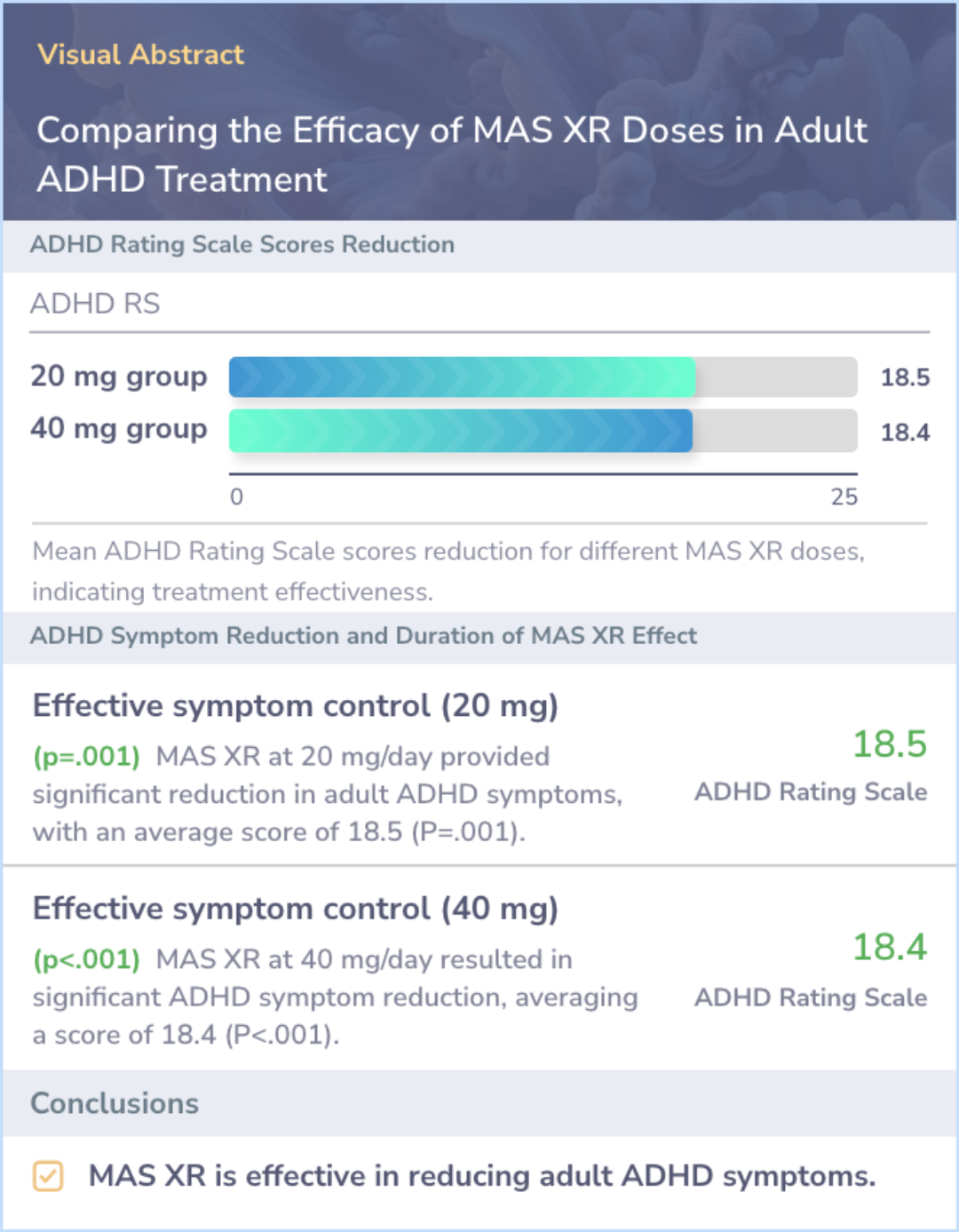
Peer Reviewed Study
Studies: Methylphenidate's Long-Term Efficacy in Adult ADHD
The first abstract focuses on long-term methylphenidate treatment for adults with ADHD. In a randomized trial, more patients showed improvement with methylphenidate compared to placebo. Long-term treatment led to an 80% decrease in symptom severity and significant improvements in social and global functioning.
The second abstract reviews studies of methylphenidate's efficacy for adult ADHD, finding a significant effect size for treatment. Higher doses correlated with stronger outcomes, supporting methylphenidate's value in adult ADHD treatment, comparable to effects seen in younger populations.
The second abstract reviews studies of methylphenidate's efficacy for adult ADHD, finding a significant effect size for treatment. Higher doses correlated with stronger outcomes, supporting methylphenidate's value in adult ADHD treatment, comparable to effects seen in younger populations.
Ritalin
Methylphenidate shows strong efficacy in reducing ADHD symptoms and improving social functioning in adults.

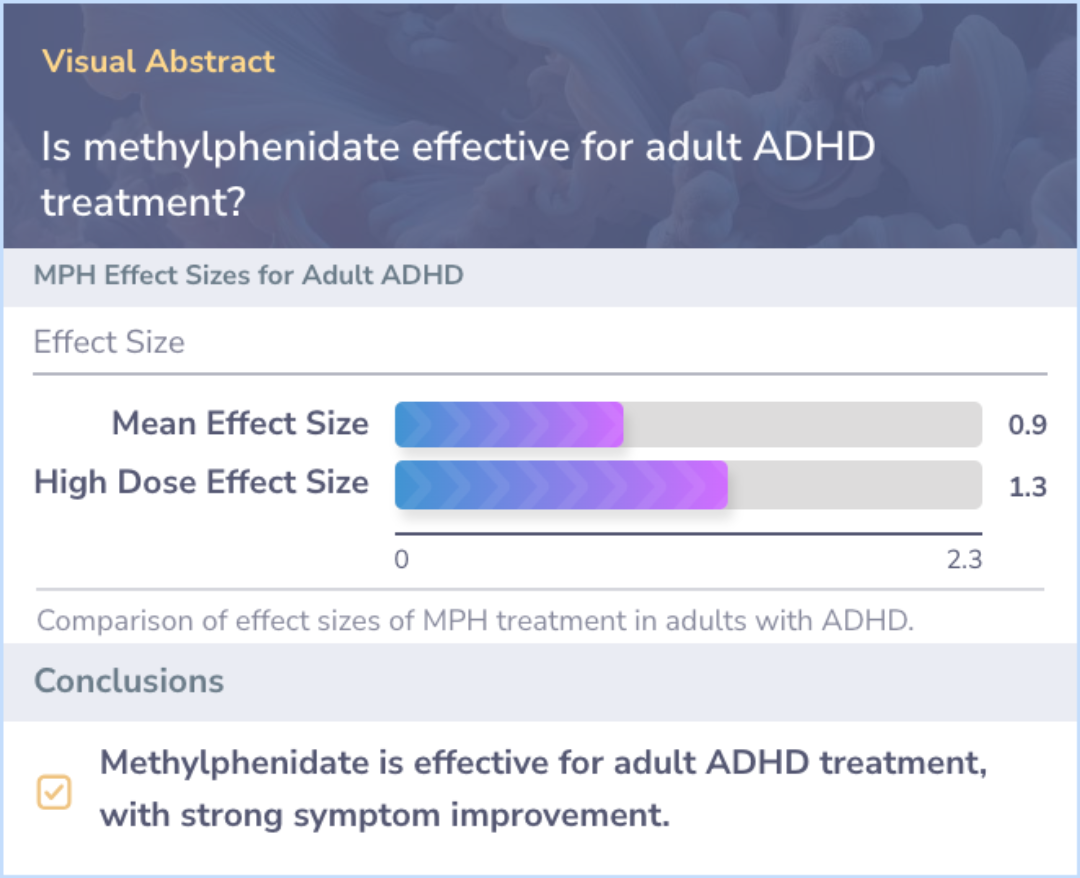
Peer Reviewed Study
Study: MAS XR Reduces ADHD Symptoms in Adults
This study demonstrated significant reductions in ADHD symptoms for adults using MAS XR (mixed amphetamine salts). Doses of 20 mg/day and 40 mg/day both achieved meaningful decreases in symptom severity, with consistent results across multiple scales.
MAS XR showed statistically significant improvements, with reductions averaging 18.4-18.5 points on the ADHD Rating Scale. Treatment effects were evident by week one and sustained for 12 hours post-dose.
MAS XR showed statistically significant improvements, with reductions averaging 18.4-18.5 points on the ADHD Rating Scale. Treatment effects were evident by week one and sustained for 12 hours post-dose.
Adderall
MAS XR demonstrated consistent efficacy.

Evidence Summary
Comparing Adderall and Strattera for Adult ADHD
Adderall, a stimulant, and Strattera, a non-stimulant, offer different approaches to managing adult ADHD. The comparison highlights how Adderall works quickly by boosting certain brain chemicals, while Strattera has a more gradual effect, impacting different pathways.
The effectiveness and side effects of these medications differ widely. Some adults may respond better to one over the other, experiencing benefits or side effects unique to each option.
The effectiveness and side effects of these medications differ widely. Some adults may respond better to one over the other, experiencing benefits or side effects unique to each option.
Evidence Summary
Methylphenidate's Role and Side Effects in Adult ADHD Treatment
Methylphenidate is frequently used to manage adult ADHD by enhancing focus and reducing impulsive actions. Many studies have shown its effectiveness, but it also carries potential side effects, such as trouble sleeping and a decreased appetite.
The medication's ability to sharpen attention and curb impulsivity makes it a commonly chosen option, yet users often report challenges with sleep disturbances and reduced appetite as significant concerns.
The medication's ability to sharpen attention and curb impulsivity makes it a commonly chosen option, yet users often report challenges with sleep disturbances and reduced appetite as significant concerns.
Evidence Summary
Adderall’s Role in Adult ADHD Treatment
Adderall is a common treatment for adults with ADHD, boosting focus and helping manage behaviors. However, its impact can vary; while some people see major improvements in concentration and self-control, others experience less pronounced changes. Adderall's effects are shaped by individual differences, making outcomes unpredictable.
The medication works by improving focus and reducing impulsivity through changes in brain chemicals, offering targeted symptom relief.
The medication works by improving focus and reducing impulsivity through changes in brain chemicals, offering targeted symptom relief.
